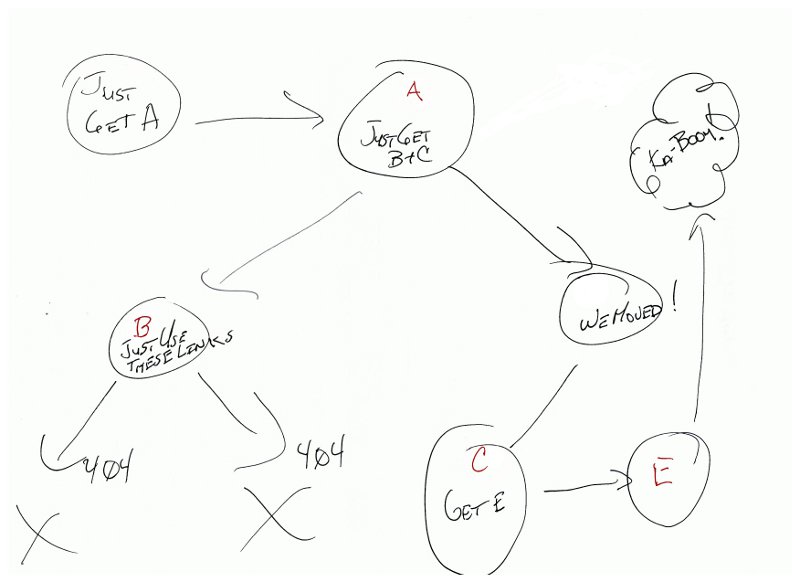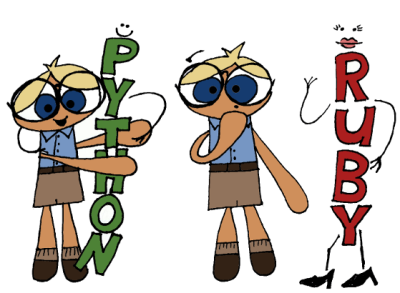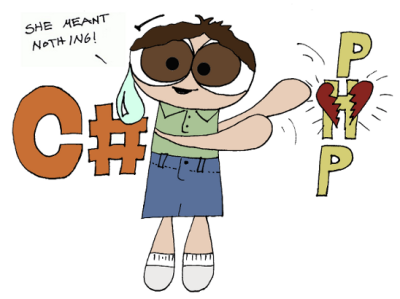Ok so maybe the title is full of sensationalism, but in some ways it’s true.
In the beginning there was Microsoft.
When I started programming at the unusually late age of 24, I was brought into the world by Microsoft. At the time, ASP was still in fair use and .Net was the new wonder drug and no one, not even Microsoft, could nail down what it was exactly. It was a miracle in a bottle, an olde time elixir. It would fix everything known and even unknown unknowns. Now personally, I had only really taken a liking to the style of C++. I preferred brackets to subs and never minded semi-colons. So you can imagine when I found out about “the C#” , I was all about it. Looking back now, it does seem sort of silly since there really wasn’t that much of a difference between VB.Net and C#, but d—-it I was going to get my semi-colons or here go hell come. Naturally this meant I would start a journey of 8+ or so years into the Microsoft frontier.
Have Carrot and Stick, Will Travel
I think one of the strongest suits of the .Net framework was Microsoft’s need to constantly improve it. Now these improvements weren’t overnight but it seems like they made a lot of improvements in relatively short time. Every version just seemed to have the answer to every question I didn’t know I needed to ask. It was like they were reading the mind of future me and adding features based on that mind. Yeah ok, it’s a little ego centric to suppose that future me was the only person asking for such things, but I’m cool with my version. I can still remember how annoyed I was that the place I was working for wasn’t going to invest in 2.0 for a while, thus keeping me from my coveted generics. (Pretty sure I said the word to the point it didn’t sound a like word anymore) And honestly, a little nerd rage was expected since I didn’t want to type every parameter as Object. I can also remember how in awe I was of Linq and some of the semi-functional programming concepts being introduced with 3.0/3.5. It seemed like as soon as I started to covet something new, BAM it was there. So really, I had no reason to ever stray from .Net because I was always well taken care of. Course then something changed and it was Microsoft’s fault.
There some things you can’t unsee
Remember that thing named Linq? Well Linq was more in line with the whole .Net mystique. It wasn’t just a way to manipulate lists, it was a whole lot more. With Linq came a few nice concepts like typed delegate, anonymous types, type inference on a much larger scale, extension methods, and a whole slew of other larger concepts like Entity Framework. It was kind of like taking a trip to the moon. Sure the whole moon thing is great, but the massive amount of new technologies that came from just getting there was where the real gold was. In the development of Linq, Microsoft had to come up with new stuff to even run the concept of Linq. At some level it was touted as Microsoft’s attempt to bring a more dynamic and functional look to C#. Now no one was claiming that C# was a functional language but d—ed if it didn’t try. After all, it’s not easy to make something more dynamic when the underlying technology is meant to be more static. Between being able to easily pass methods around like objects and using lambda expressions to simplify dealing with lists, it was a huge step forward and personally a large shift in my programming paradigm. (Yes I just used paradigm in my blog.) So where’s the catch? It’s simple, my eyes were opened to stunning new concepts. The use of Linq, lambda expressions, and Func/Action got me to start looking at programming as a whole in a different way. I wanted to be more dynamic. I wanted to start solving old issues using all this exciting stuff. And because of this I started expecting more and pushing .Net to the limits. For the first time in my programming career, the carrot was chasing me.
Model View what?
If Linq was the straw that broke the camel’s back, then MVC was the bus that ran it over by mistake. For years I had been in the standard world of Web Forms. Something that at one time seemed to be a beautiful bridge between the web and stand alone projects was now looking worse and worse. All the issues I had with Web Forms were now being magnified by the overall streamlined approach with MVC. It was such a strong double-hit between Linq and MVC that I just couldn’t ignore the outside world anymore. It’s sort of like that moment when you realize that your parents are human just like you. It makes you think that maybe everything you knew wasn’t actually the only way to do things. That maybe there’s something more out there. Maybe, just maybe, people didn’t eat cold pizza with syrup. This was the moment when I started wondering if there was something greater out there. (Just like Vger) Because I had never dabbled in anything outside of .Net (except a regrettable affair with PHP that still worries me that someday a little PHP will show up at my door claiming that I’m it’s dad) so this concept was brand new to me. Of course anyone who wasn’t completely clueless like me would have known that MVC had been used by things like Java for quite a few years. To makes matters ever worse, the poor camel was struck by a huge meteor named Javascript. Yes, I typed Javascript. With MVC came my heavy use of Javascript and it’s much fancier suit and tie JQuery, and guess what? I noticed that most of the cool new dynamic stuff for .Net was being used in Javascript all the while. I had shied away from Javascript for a long time since I was brainwashed into thinking it was evil. Just use post backs and server side code. Stay away from the language that we dare not speak its name. Problem was, it is almost a need when using MVC unless you want to refresh the page on any form post. Long story short, I was reeling from all this new information.
Every silver lining has a dark cloud
One thing that I didn’t like about most examples of how the model and view work together was the use of a dictionary to hold values that would appear on the view. I’ve never liked magic string programming so I naturally went with typed views. This meant that for every view I would have a model class working alongside to help pass values in a much more clean and safe way. The issue? A whole f–king lot of models. So much that it almost became a separate project in itself to hold all of them. Something just didn’t seem right about this. One of the nice things about C# is it’s more rigid feel to keep people from screwing things up (unlike the magic string theory). Problem was, for rapid development this just didn’t cut it. And let’s be honest, in the real world (unless you are the lucky few that have decent deadlines, i.e., top-end jobs) rapid is all we get. This left me in an uncomfortable place. We’re talking showing-up-to-school-naked-and-realizing-it’s-not-a-dream-this-time uncomfortable.
In time all things become clear
It would seem natural that if I liked all the more dynamic features of .Net and Javascript, I would possibly try to find a language that suited my needs. Well there’s an old thought in psychology: People don’t change unless something makes them. And as much as I’d like to say I braved the new world on my own, it really was more of a wake up call. While Microsoft has done a lot to add needed complexity to the framework, they continue to add far too much simplicity.
Not to long ago, some time after 4.0 was just about to go “gold” I read a couple articles on how easy programming was becoming in the .Net world, and how salaries for .Net were starting to drop. To sum it up, Microsoft has always tried to walk two lines: Cater to the more expert programmer AND the drag-and-drop programmer. Some nice examples would be from 2.0 in generics and update panels. Generics are still not understood by drag-and-drop programmers (as I have been shown on many occasions) but man they love their update panels. I mean it’s ajax without actually knowing anything about it. And I think this is where .Net is going to head. I think as elitist programmers we’d like to think that knowing design patterns and how to successfully design a streamlined system is important but honestly, it isn’t. And I’m saying this as a person who has had 7+ jobs jobs in the last 9+ years. Businesses want results. They don’t care if it costs them more in the end if you hack something together. I’ve never really met a company that thought that far ahead, and in some ways I can understand this. Getting to the market first can be a huge advantage. The “Just get something out now and worry about it later” mantra is prevalent in all walks of business. It’s hard to convince companies to take more time to develop a more solid system. Because of this, things like update panels and drag-and-drop design are still hanging strong which by proxy means having a solid understanding of how things work really doesn’t matter as much.
Though way too lengthy of a side bar, the point is that this is the event I needed to change. Because Python is a more fringe language but is used by some really good companies, it seemed like a reasonable switch… or at least something to experiment with. There is nothing really drag-and-drop about it.
If at first you don’t succeed…
I will admit that at first I was a little apprehensive about Python. It just didn’t seem to offer anything that C# didn’t… again at first. However, the more I used Python and Pylons, the more free I felt. All those years of pushing and expecting rigidity were washing away. Don’t me wrong, it took a while to really get how powerful Python can be. I mean stuff like adding properties to objects dynamically was nice, but that was also in 4.0. Passing methods like objects: C#… well at least with some restrictions. But with that being said, having options like that without the need for typing parameters and done so with a natural feel made it pretty well suited for web development. I’m not going to spout the virtues of Python and I’m pretty sure I’ve derailed this post quite a bit, but the moral of the story is simple:
There’s more out there than Microsoft/.Net. Now I realize that probably 2/5 readers (not a fraction but an actual guess on how many people will read this) will be thinking ‘DUH’ but this isn’t really written for people who know this already. This is written so that even Microsoft slappies like me can break free of a what I thought was the be-all and end-all, and really learn something new that isn’t new to .Net. I’ve built my career around .Net and have no doubt it will most likely be what I’m paid to use for a while. With that being said, there’s absolutely nothing wrong with trying new paths. Is Python the language to do this for you? I have no idea. Maybe it’s Ruby or (maybe(the(language(is(Lisp))))). That I can’t tell you. Only thing I can tell you is that you won’t know until you get out and try something new. You can’t possibly know what’s out there if you stay at the house that Microsoft built. In a world with too few eggs and a ton of baskets, you really can’t afford keep things the same.






















